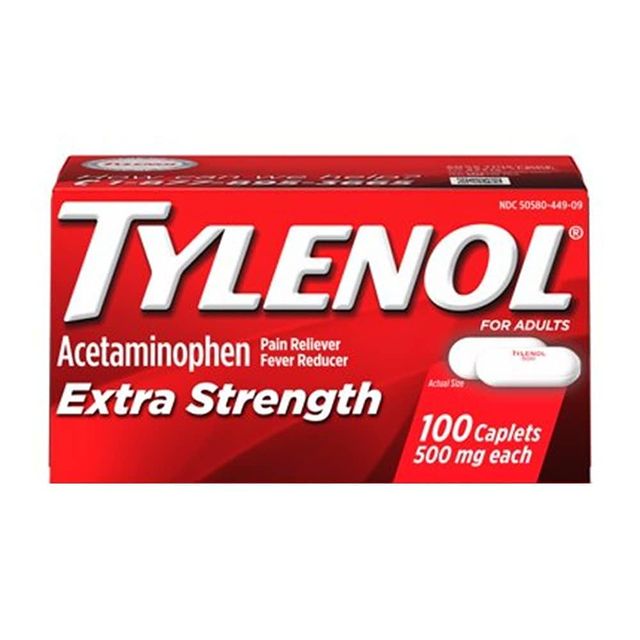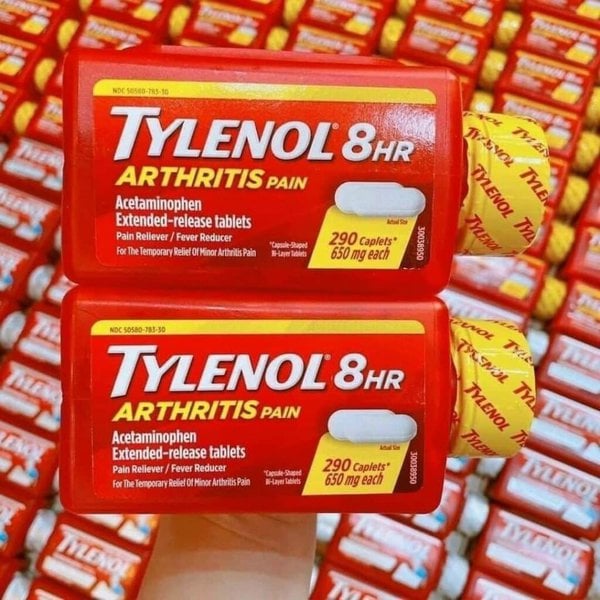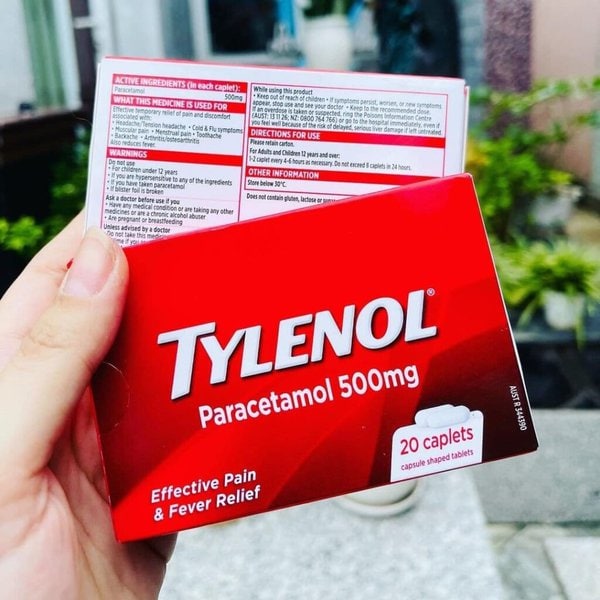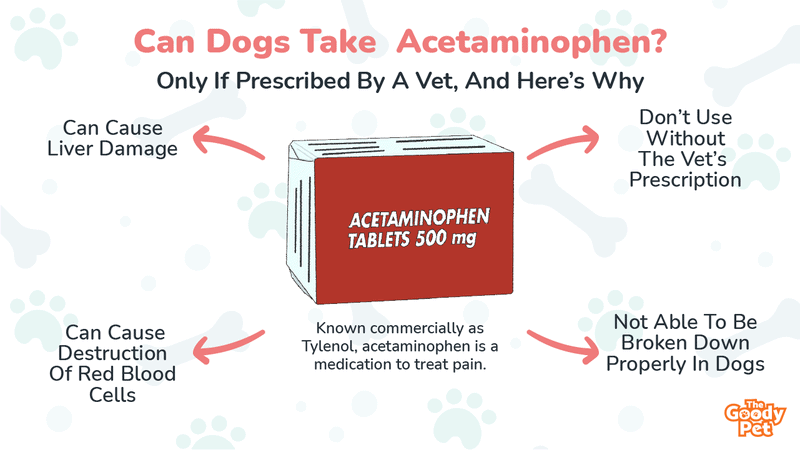We all hate to see our dogs in pain, and this is what motivates some people to grab the nearest painkiller in a bid to alleviate their canine buddy’s pain. At times, the nearest painkiller can be a human medication such as acetaminophen, and it is unclear whether or not this drug is safe to be administered to dogs. So, can dogs take acetaminophen?
Acetaminophen contains properties that make it dangerous for use in dogs. However, with a vet’s prescription, acetaminophen can then be safe and effective to use for dogs in small doses, although it has to be said that there are far better and safer painkilling options, like carprofen.
Using Tylenol to treat your dog’s pain without a vet’s prescription is akin to endangering your canine buddy’s life, and the side effects of administering this drug without a proper prescription are well outlined in this article. However, before we go into all this, let’s look at what acetaminophen is and why it isn’t safe for canine use.
Can Dogs Take Acetaminophen?

No, acetaminophen isn’t safe to use for dogs unless under direct supervision and instruction from a vet.
What Is It Used For?
Acetaminophen, known commercially as Tylenol, is a medication that is mainly used to treat pain in the form of headaches and menstrual cramps or to reduce fever among humans.
It is mostly used either as a standalone drug or with a combination of other ingredients to make a potent painkilling drug.
Why Is Acetaminophen Bad For Dogs?
Acetaminophen is safe to use for humans at a recommended dosage, but with dogs, it is a different case entirely.
And the reason for this is simple – the mechanism for breaking down acetaminophen in a dog’s body, and converting it to its useful form, is completely different from what is obtainable with humans. In other words, this mechanism is non-existent in dogs.
Tylenol is typically used by vets as a last resort when other painkillers fail to work. Even then, it is difficult to determine how much of this drug is considered safe to use for dogs unless your vet is issuing a written prescription.
That said, scientists are at a loss to explain how acetaminophen works in a dog’s body, so it is recommended to completely avoid this drug when it comes to treating your canine buddy’s pain and inflammation.
However, if you decide to persist with treating your dog with acetaminophen, you’d be exposing the pooch to several health risks, some of which are outlined in the subsequent section.
Why Is Acetaminophen Bad For Dogs?

Treating dogs with acetaminophen can result in either liver failure or the destruction of essential red blood cells.
Liver Damage
The significant consequence of treating your dog with acetaminophen is extensive damage to the pooch’s liver. What makes this condition even worse is that symptoms of liver damage due to treating your pooch with acetaminophen sometimes don’t manifest until several days after treating your pooch with this drug.
And if not promptly attended to, liver damage can result in a dog’s death.
Common symptoms that can alert you of a potential issue with your canine buddy’s liver include darkened urine, an enlargement of the abdomen, discoloration of the eyes and skin, increased water intake, and excess urination, just to mention a few.
Destruction Of Red Blood Cells
Apart from damage to the pooch’s liver, treating a dog with acetaminophen can result in widespread damage to the dog’s red blood cells. And damage to these red blood cells can occur between 4 to 12 hours after the acetaminophen settles in the pooch’s body system.
Observable signs that your pooch is suffering from the destruction of its red blood cells include weakness, loss of appetite, panting, vomiting, and rapid breathing. And if you notice any of these symptoms in your pooch after administering acetaminophen, you should get the dog to a vet right away!
What Should You Do If Your Dog Takes Acetaminophen?
If your dog ingests acetaminophen by mistake, the immediate course of action is to get on the phone and explain the situation to your emergency vet or an animal poison control center.
Tylenol is typically absorbed into a dog’s bloodstream within 30 minutes after usage, which is why you should act quickly.
If acetaminophen ingestion occurs within a few minutes of you reporting the incidence, your vet will likely ask you to bring the pooch over and attempt to induce vomiting to get rid of the drug before it is absolved into the pooch’s bloodstream; Alternatively, the vet may give you instructions to induce vomiting from home.
In addition to inducing vomiting, the vet may pump the dog’s stomach and make use of activated charcoal to ensure that acetaminophen isn’t absorbed into the dog’s gastrointestinal tract.
If your pooch has ingested significant amounts of acetaminophen, hospitalization will be required to properly monitor and treat the pooch’s symptoms.
What Can I Give My Dog Instead Of Acetaminophen?
Healthy substitutes for acetaminophen usage on dogs include nonsteroidal drugs such as carprofen and deracoxib, aspirin, and pain supplements such as glucosamine and chondroitin.
Nonsteroidal Anti-Inflammatory Drugs
Top on our list of healthier alternatives to acetaminophen for dogs is any of the readily available over-the-counter nonsteroidal anti-inflammatory drugs (NSAIDs). The common examples of the NSAIDs that are safe to use for dogs include carprofen, deracoxib, firocoxib, and meloxicam.
These NSAIDs work by inhibiting the functions of the enzyme cyclooxygenase, which is responsible for the production of the pain-inducing and inflammatory hormones prostaglandins.
It is also important to note that the hormone prostaglandins are responsible for maintaining adequate blood flow to a dog’s kidney, normal blood clotting, and production of mucus to protect a dog’s gastrointestinal tract.
That said, using any of these NSAIDs without an appropriate dosage can inhibit the proper functioning of the hormone prostaglandins, and this can have serious side effects on a dog. To prevent this from happening and to maintain your canine buddy’s well-being, you shouldn’t use NSAIDs without a prescription from your vet.
Dietary Supplements
Equally good alternatives to acetaminophen usage for dogs are dietary supplements such as glucosamine and chondroitin.
These supplements contain special anti-inflammatory properties, and research shows that they may actually help repair damaged cartilage. However, as with NSAIDs, it is recommended that you discuss with your vet before including these supplements in your canine buddy’s diet.






